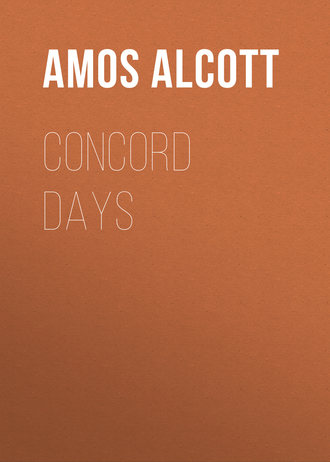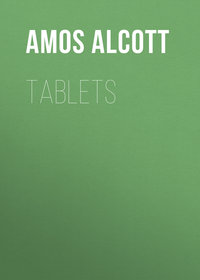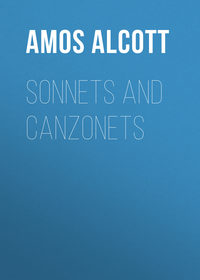 полная версия
полная версияConcord Days
11
"FRUITLANDS.
"We have received a communication from Messrs. Alcott and Lane, dated from their farm, Fruitlands, in Harvard, Massachusetts, from which we make the following extract: —
"'We have made an arrangement with the proprietor of an estate of about a hundred acres, which liberates this tract from human ownership. For picturesque beauty, both in the near and the distant landscape, the spot has few rivals. A semicircle of undulating hills stretches from south to west, among which the Wachusett and Monadnock are conspicuous. The vale, through which flows a tributary to the Nashua, is esteemed for its fertility and ease of cultivation, is adorned with groves of nut trees, maples, and pines, and watered by small streams. Distant not thirty miles from the metropolis of New England, this reserve lies in a serene and sequestered dell. No public thoroughfare invades it, but it is entered by a private road. The nearest hamlet is that of Stillriver, a field's walk of twenty minutes, and the village of Harvard is reached by circuitous and hilly roads of nearly three miles.
"'Here we prosecute our effort to initiate a Family in harmony with the primitive instincts in man. The present buildings being ill placed and unsightly as well as inconvenient, are to be temporarily used, until suitable and tasteful buildings in harmony with the natural scene can be completed. An excellent site offers itself on the skirts of the nearest wood, affording shade and shelter, and commanding a view of the lands of the estate, nearly all of which are capable of spade culture. It is intended to adorn the pastures with orchards, and to supersede ultimately the labor of the plough and cattle, by the spade and the pruning-knife.
"'Our planting and other works, both without and within doors, are already in active progress. The present Family numbers ten individuals, five being children of the founders. Ordinary secular farming is not our object. Fruit, grain, pulse, garden plants and herbs, flax and other vegetable products for food, raiment, and domestic uses, receiving assiduous attention, afford at once ample manual occupation, and chaste supplies for the bodily needs. Consecrated to human freedom, the land awaits the sober culture of devout men.
"'Beginning with small pecuniary means, this enterprise must be rooted in a reliance on the succors of an ever-bounteous Providence, whose vital affinities being secured by this union with uncorrupted fields and unworldly persons, the cares and injuries of a life of gain are avoided.
"'The inner nature of every member of the Family is at no time neglected. A constant leaning on the living spirit within the soul should consecrate every talent to holy uses, cherishing the widest charities. The choice Library (of which a partial catalogue was given in Dial No. XII) is accessible to all who are desirous of perusing these records of piety and wisdom. Our plan contemplates all such disciplines, cultures, and habits as evidently conduce to the purifying and edifying of the inmates. Pledged to the Spirit alone, the founders can anticipate no hasty or numerous accession to their numbers. The kingdom of peace is entered only through the gates of self-denial and abandonment; and blessedness is the test and the reward of obedience to the unswerving law of Love. —The Dial.
"'June 10, 1843.'"12
Printed from notes taken by a lady (Miss Ariana Walker) at the time. The conversation was held in Boston in December, 1849.
13
THE TEMPERAMENTS AND COMPLEXIONSThe Sanguine or Aeriform is Fair;The Choleric or Fiery is Florid;The Lymphatic or Aqueous is Olive;The Melancholic or Earthy is Dark.The four are mostly blended in life, the fusion being frequently indeterminable.
14
The seeming miracle and mystery of the mesmeric, or clairvoyant vivacity, is best explained by conceiving the instreaming force of the operator driving the magnetic current from cerebrum to the cerebellum of his victim, and there, while under the pressure, reporting the operator's sensations and thoughts through the common brain of both. And this view is confirmed by the further fact that under this dominating force the domain of memory is the more deeply searched, and things revealed which, separate and alone, left unaided by such agencies, neither could have divined. It is like one's adding a double brain to his own, and subsidizing it the while to serve his particular ends.
15
"The great interest is not in the present city of Syracuse" (writes a traveller, Feb. 9, 1869), "but in its vicinity, where we inspect the doings of Greeks twenty-five to three thousand years ago, and of the Romans at a later date. Their works are constructed out of the solid rock, and have withstood the terrible earthquakes which have completely destroyed all traces of other works. Among the interesting objects in the city is the cathedral, formerly the temple of Minerva, which is a magnificent specimen of Doric architecture, and has continued to be a place of worship through all the changes of idolatry and Christianity, for twenty-five hundred years; the church of St. Marcian here puts in its claim to have been the first church in Europe in which Christian worship was celebrated. Full of interest are the catacombs and the ancient prisons in the quarries from which the materials of Syracuse were taken; here is the Ear of Dionysius, the tyrant of Syracuse, a prison so arranged that every word spoken within it was re-echoed into his chamber, where it is said he passed entire days listening to the complaints of his victims. Here, too, is the famous fountain of Arethusa, one of the Nereads, and whom Virgil reckons among the Sicilian nymphs, as the divinity who inspired pastoral poetry. Syracuse was at different periods the residence of Plato, Simonides, Zeno, and Cicero; it was the place where Hicetus first propounded the true revolution of the earth; it was the birthplace of the poets Theocritus and Moschus, and the philosopher Archimedes, who lost his life at the capture of the city by the Romans."
16
Born B.C. 429; died 348.
17
"Plato," says Grote, "appreciated dialogue, not only as the road to a conclusion, but for the mental discipline and suggestive influences of the tentative and verifying process. It was his purpose to create in his hearers a disposition to prosecute philosophical researches of their own, and at the same time to strengthen their ability of doing this with effect. This remark is especially confirmed in the two dialogues, the Sophisticus and Politicus, wherein he defends himself against reproaches seemingly made at the time. To what does all this tend? Why do you stray so widely from your professed topic? Could you not have reached the point by a shorter road? He replies by distinctly proclaiming – that the process, with its improving influence on the mind, stands first in his thoughts, the direct conclusion of the inquiry only second; that the special topic which he discusses, though in itself important, is nevertheless chosen primarily with a view to its effect in communicating general method and dialectical aptitude, just as a schoolmaster, when he gives out to his pupils a word to be spelt, looks mainly, not to the exactness in spelling the particular word, but to their command of good spelling generally. To form inquisitive testing minds, fond of philosophical debate as a pursuit, and looking at opinions on the negative as on the positive side, is the first object of most of Plato's dialogues: to teach positive truth, is only a secondary object." —Grote's Plato, Vol. II, p. 399.
18
Among the works deserving of a wider circulation is Thomas Stanley's "History of Philosophy." It well repays perusal, compiled as it was by an enthusiastic student of ancient thought, from reliable sources, and embodying, in an attractive style, "the Lives, Opinions, Actions, and Discourses of the Philosophers of every Sect, illustrated with Portraits of many of them. Third edition. Folio, pp. 750. London, 1701." The preceding notes are mostly extracted from this history.
19
If his "Republic" and "Laws" hardly justify him against those who accused him of having written a form of government which he could persuade none to practise, it may be said, in his favor, that he gave laws to the Syracusians and Cretans, refusing the like to the Ayreneans and Thebans, saying, "It was difficult to prescribe laws to men in prosperity."
20
"The philosophy of the fourth century, B. C.," says Grote, "is peculiarly valuable and interesting, not merely from its intrinsic speculative worth, – from the originality and grandeur of its two principal heroes, Plato and Aristotle, – from its coincidence with the full display of dramatic, rhetorical, artistic genius, but also from a fourth reason not unimportant because it is purely Hellenic; preceding the development of Alexandrian and the amalgamation of Oriental veins of thought, with the inspirations of the Academy and the Lyceum. The Orentes and the Jordan had not yet begun to flow westward, and to impart their own color to the waters of Attica and Latium. Not merely the real, but also the ideal, world present to the minds of Plato and Aristotle, were purely Hellenic. Even during the century immediately following, this had ceased to be fully true in respect to the philosophers of Athens; and it became less and less true with each succeeding century. New foreign centres of rhetoric and literature, Asiatic and Alexandrian Hellenism, were fostered into importance by regal enactments. Plato and Aristotle are thus the special representatives of genuine Hellenic philosophy. The remarkable intellectual ascendancy acquired by them in their day and maintained over succeeding centuries, was one main reason why the Hellenic vein was enabled so long to maintain itself, though in impoverished condition, against adverse influences from the East, ever increasing in force. Plato and Aristotle outlasted all their pagan successors, – successors at once less purely Hellenic and less gifted. And when St. Jerome, near seven hundred and fifty years after the decease of Plato, commemorated with triumph the victory of unlettered Christians over the accomplishments and genius of paganism, he illustrated the magnitude of the victory by singling out Plato and Aristotle as the representatives of vanquished philosophy." —Grote's Preface to Life of Plato.
21
A mystic book entitled "Quinquenergia, or Proposals for a new Practical Theology," by Henry S. Sutton, was published in London in 1854. Mr. Sutton is plainly tinctured with Boehme's theosophy, if not a disciple of his as appears from his book. It is a volume of singular originality, and the latest modern attempt at a Genesis from First Principles that I have met with. It seems to have attracted few readers in England or in this country.
22
Students of Boehme have been few and far between. Edward Taylor appears to have been Boehme's most distinguished disciple in England before William Law. He published "A Compendious View of the Teutonic Philosophy." London, 1670. Also Jacob Boehme's "Philosophy Unfolded in divers Considerations and Demonstrations, and a Short Account of his Life." London, 1690. John Sparrow published Boehme's Tracts and Epistles. London, 1662. John Pordage's "Theologia Mystica, or the Mystic Divinity of the Eternal Invisibles," London, 1683, is a rare volume.
23
The "Cyclopedia of Pure Christian Theology and Theosophic Science," is to contain the works of Boehme and his distinguished followers, Freher, Gechtel, Pordage, Lee, Law, and others. The first volume is already printed for private circulation, and deposited in the chief libraries of Europe and America. It contains six hundred and eighty-eight closely printed pages, chiefly of exposition and comment on Boehme, with biographical accounts of Boehmists and of their works interspersed in voluminous notes.
24
It appears from "Letchford's Plain Dealings concerning New England," that the church in Concord was the first in the colony that adopted the practice of catechising the children on Sundays. "The unmarried people," he says, "were also required to answer questions, after which Mr. Bulkeley gave expositions and made applications to the whole congregation." And this practice soon found its way into all the churches, became a part of the Sunday service in the church, in the family at last. From these it passed, subsequently, into the schools, a part of Saturday forenoon being devoted to recitations, and where the parents were of different persuasions, the teachers heard these from the Westminster, or Church of England catechisms, accordingly. Some of us remember committing both to memory, and having the benefit of so much comparative divinity as these furnished at that early age.
25
By Thomas Heywood, 1590.



